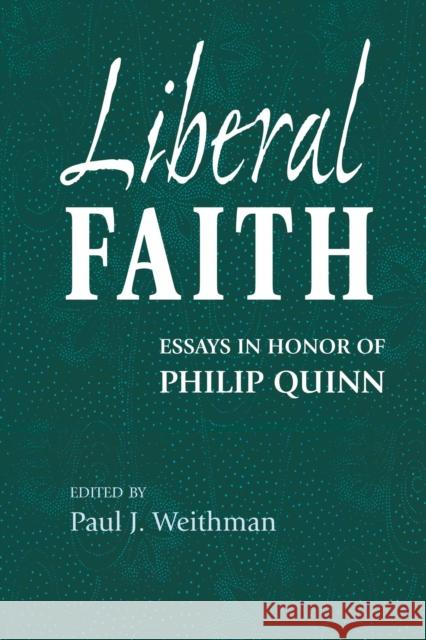Liberal Faith: Essays in Honor of Philip Quinn » książka
Liberal Faith: Essays in Honor of Philip Quinn
ISBN-13: 9780268044169 / Angielski / Twarda / 2008 / 224 str.
Philip Quinn, John A. O Brien Professor at the University of Notre Dame from 1985 until his death in 2004, was well known for his work in the philosophy of religion, political philosophy, and core areas of analytic philosophy. Although the breadth of his interests was so great that it would be virtually impossible to identify any subset of them as representative, the contributors to this volume provide an excellent introduction to, and advance the discussion of, some of the questions of central importance to Quinn in the last years of his working life.Paul J. Weithman argues in his introduction that Quinn s interest and analyses in many areas grew out of a distinctive and underlying sensibility that we might call liberal faith. It included belief in the value of a liberal education and in rigorous intellectual inquiry, the acceptance of enduring religious, cultural, and political pluralism, along with a keen awareness of problems posed by pluralism, and a deeply held but non-utopian faith in liberal democratic politics. These provocative essays, at the cutting edge of epistemology, the philosophy of religion, philosophical theology, and political philosophy, explore the tenets of liberal faith and invite continuing engagement with the philosophical issues. Philip Quinn was admired enormously throughout the world of professional philosophy . . . . His reputation for rigor, his tireless service to the profession, and his essentially non-dogmatic, but philosophically sophisticated faith is widely admired . . . The essays in this volume are first-rate contemporary philosophy along with an excellent introduction to Quinn s work. Charles Taliaferro, St. Olaf College"The papers that form "Liberal Faith" give insightful treatments of three types of questions: first, how can we conscientiously believe something when there are many people we admire who do not believe it, and what is the underlying relation here between justification and rationality; second, what does it mean to desire union with God, and can Christians properly believe in the possibility of eternal self-annihilation; third, how should liberal democracy accommodate the religious convictions of its members, whether some comprehensive doctrine such as a religion is required to justify a commitment to human equality, and whether there is an absolute moral prohibition on the state use of torture. The volume has an unusually good introduction putting the papers into dialog with each other and with the work of Philip Quinn. The papers are cohesive because the central themes of Philip Quinn's work hold together into a picture of how Christianity and Liberal Democracy fit together." John Hare, Noah Porter Professor of Philosophical Theology, Yale Divinity School This is a collection of high quality essays dealing with various topics related to Philip Quinn s work. The book makes an original contribution by virtue of its individual papers, each of which is new. These essays will be of interest to scholars and students who followed Quinn s work, especially in philosophy of religion and political philosophy. John Greco, The Leonard and Elizabeth Eslick Chair in Philosophy, Saint Louis University "











